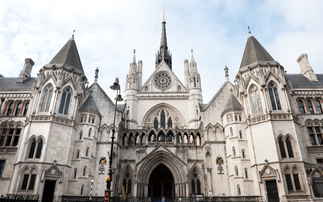
Peter Murphy: The importance of properly considering whether to pursue a claim to recover losses is increasingly being recognised
Happily, the pensions world rarely sees the sort of litigation driven by advertising slogans like “where there’s blame there’s a claim”. But trustees and sponsoring employers are increasingly recognising the importance of properly considering whether to pursue a claim to recover losses, both from a governance and a commercial perspective.
For those without any experience of pensions litigation (who are still very much in the majority), you may be thinking "what does ‘proper consideration' look like?". Here are a few key pointers.
Cost benefit analysis
Always carry out a cost / benefit analysis as early as possible – seek to understand the likely value of the claim, its prospects of success, and the likely costs involved.
In theory, the costs can continue to be incurred up until the court delivers its final judgment (and potentially, to some extent, after that). Depending on the outcome of the case, the court could also make an order for you to cover the other party's costs. This means that the potential total costs could seem very large. But it is important to bear in mind that costs are incurred in stages, so you can review the position from time to time and decide whether or not to continue to pursue the claim.
Although the total potential costs of pursuing a claim are relevant, many pensions claims are settled or withdrawn at a fairly early stage, so it is generally more important to have a clear understanding of the likely costs associated with those earlier stages of a potential claim. Those costs can then be weighed against what might be a reasonably achievable financial settlement in that same timeframe.
Pursuing a claim before the formal court process begins
For many years now, the rules of the High Court in England and Wales have been designed to ensure that the work associated with litigation is carried out at an early stage. The court has a "Pre-Action Protocol" which drives a considerable amount of engagement between the parties before the formal court process has begun – including a requirement to consider engaging in some form of alternative dispute resolution (ADR).
Parties to pensions claims often engage in ADR and this looks increasingly likely to be the direction of travel, with the court rules having now been amended to include an expanded objective of "promoting or using alternative dispute resolution". The courts also have expanded case management powers, which now include "ordering or encouraging the parties to use, and facilitating the use of, alternative dispute resolution".
What do you need to know about ADR?
- What is ADR? Don't be intimidated by the tag "ADR". It is simply a description of any process (of which there are many variations, including mediation) by which there is a voluntary exchange of information and engagement between parties with a view to reaching a negotiated settlement and/or narrowing and clarifying the aspects that are the obstacle to a settlement.
- Timings and compromise. The timing of any ADR process is important to its likely success. Getting a settlement requires all parties to be willing to compromise. Too early and the parties may not have appropriate and realistic expectations of the strength of their respective positions (legally and, perhaps, commercially), or the nature and extent of the compromises that might be necessary to achieve a settlement. Too late and the parties' positions may have become entrenched – in terms of both the issues in dispute and the costs they have incurred and feel they need to recover from the other party.
- Preparation is key. Or, to adopt another commonly used phrase, "you get out what you put in" to ADR. Not only in terms of preparing your own case, but also in considering the other party's case and how to get the best outcome in the circumstances. Make sure that you understand the process, and are clear about your role and your objectives.
Parting message
Litigation can be costly and is often a distraction from the day to day running of a pension scheme, but it can facilitate positive outcomes.
So don't approach potential litigation with a negative (or, indeed, an emotional) mindset. Weigh up the pros and cons with an open mind. Where possible, trustees and sponsoring employers should try and engage on the issues at an early stage and agree whether to pursue the claim. And if you do decide to pursue it, always bear in mind the possibility of a negotiated settlement, and how best to achieve it.
Peter Murphy is a partner at Sackers






